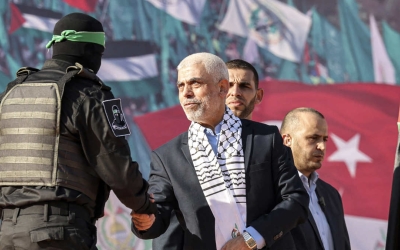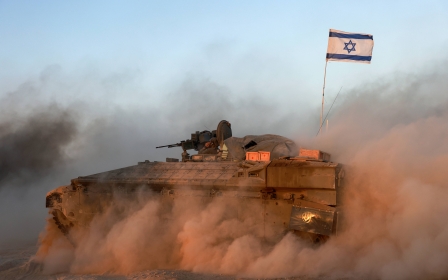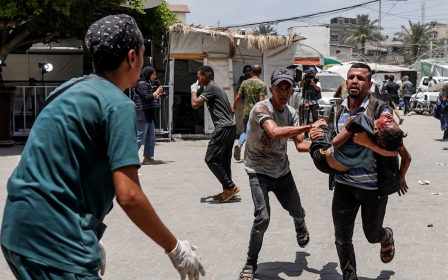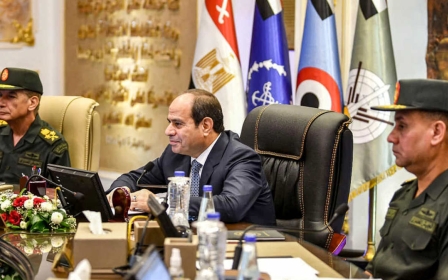War on Gaza: Does Israel's hostage rescue mark the start of deeper US involvement in the war?

A video has captured a helicopter loading Israeli soldiers and hostages rescued in a daytime raid in Gaza. A pier built by the US military to funnel aid into the beseiged enclave floats on the Mediterranean Sea a few metres away.
The same day that the helicopter ferrying hostages and soldiers from Gaza back to Israel touched down at the beach, the US announced that its pier had reopened after being damaged in a storm.
"If the US wanted people to believe it was directly involved in Israel's hostage rescue operation, it couldn't have done a better job," a former US official familiar with military operations in Gaza told Middle East Eye on condition of anonymity.
The rescue on Saturday of four Israeli hostages from Hamas in Gaza has been celebrated by Israelis, who have been fixated on the fate of their countrymen taken into captivity after the Hamas-led 7 October attack on southern Israel.
But the deadly attack has caused an outpouring of anger among Palestinians and critics of Israel, who note that the rescue of four Israelis resulted in at least 274 Palestinians killed, according to Palestinian health officials.
New MEE newsletter: Jerusalem Dispatch
Sign up to get the latest insights and analysis on Israel-Palestine, alongside Turkey Unpacked and other MEE newsletters
The raid also left US officials fielding questions about the extent of their involvement in Israel's attack after US National Security Adviser Jake Sullivan said the US had provided support to Israel over several months in its effort to identify the locations of captives in Gaza and retrieve them.
Centcom, the US's overall military command for the Middle East, said that while Israel used an area south of the US-built pier as a landing zone, "the humanitarian pier facility, including its equipment, personnel and assets were not used in the operation to rescue hostages".
However, a US defence official, speaking with MEE on condition of anonymity, said Israel's use of the beach with the pier a stone's thrown away, "implies we were part of it".
The current and former US officials who spoke with MEE would not comment on the specific assistance the US provided Israel for the attack, but both said that the US would have been notified of Israel's exfiltration plan via the beach because the US maintains an air defence system at the pier.
Ceasefire stalled
The response to Israel's hostage rescue operation unfolded against the backdrop of Washington's flagging efforts to push Hamas and Israel into a ceasefire agreement.
The deal's prospects appeared to face a setback on Tuesday, after Hamas issued its response to a US-mediated ceasefire proposal. The US, Israel and Hamas squabbled over the meaning of the reply.
US Secretary of State Antony Blinken claimed that Hamas had proposed "numerous changes" to the proposal Biden laid out on 31 May. 'Some of the changes are workable. Some are not."
Osama Hamdan, a senior Hamas official, denied on Wednesday that the group had put forward any new ideas for the ceasefire.
Hamas officials have previously said they want guarantees that the deal, which was also outlined by US President Joe Biden last month and endorsed by the UN Security Council on Monday, would not allow Israel to restart fighting once Hamas releases hostages as part of the first stage of a three-phase deal.
"Israel's argument has always been that it doesn't need a ceasefire to rescue hostages," Frank Lowenstein, the former special envoy for Israeli-Palestinian negotiations in the Obama administration, said. "The rescue operation is likely to deepen Israel's resolve on that."
With ceasefire talks stalled, the Biden administration faces the ugly prospect of being dragged deeper into the daily drudgery of its ally's war on Gaza; a territory that some UN officials have labeled "Mogadishu on the Mediterranean".
Israeli National Security Adviser Tzachi Hanegbi said in May that Israel anticipates at least seven more months of war in Gaza.
Lowenstein said that if the Biden administration can't achieve a ceasefire, it will likely feel no choice but to wade more deeply into how Israel is waging war on Gaza and addressing the humanitarian crisis.
"I don't see us owning this war anymore then we already do," he said. "The question now is that with the ceasefire failing do we have to get more involved with the nitty-gritty, on the ground, in order to prevent this from getting completely out of control?"
Giving Israel a win
If the war does drag on, sharing intelligence with Israel to locate and rescue the captives in deadly attacks like that on the Nuseirat refugee camp could become more common, analysts and former US officials tell MEE.
The US has already accelerated efforts to help Israel find and kill Hamas's Gaza chief, Yayha Sinwar, MEE previously reported.
And the US has doubled down on controversial efforts to distribute aid to Gaza. Centcom said on Saturday - the same day that Israel's military landed in sight of the pier - that the US had unloaded 1.1 million pounds of humanitarian aid off the $230m facility. Critics of the pier have said it is a distraction from the immediate need for Israel to reopen land crossings into Gaza.
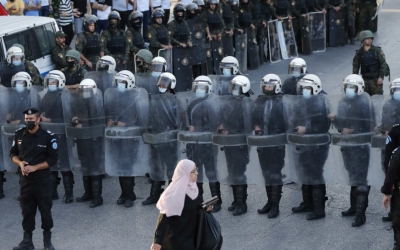
When Biden unveiled what he said was an Israeli ceasefire proposal on 31 May, he coached it in the language of victory for Israel, saying: "At this point, Hamas is no longer capable of carrying out another October 7."
But analysts say that by trying to convince Israel of that, the US could simply be furthering its resolve to continue the war.
"The Israelis keep finding ways to tell the Biden administration they aren't doing enough and more needs to be done, either on the intelligence side, or military support," Ayham Kamel, head of Middle East and North Africa at political-risk advisery firm Eurasia Group, told MEE.
"Giving the Israelis a win is what the administration is looking for in an attempt to end this."
One former US official familiar with the Biden administration's thinking told MEE that the administration "can't help itself from becoming more deeply involved".
Middle East Eye delivers independent and unrivalled coverage and analysis of the Middle East, North Africa and beyond. To learn more about republishing this content and the associated fees, please fill out this form. More about MEE can be found here.


